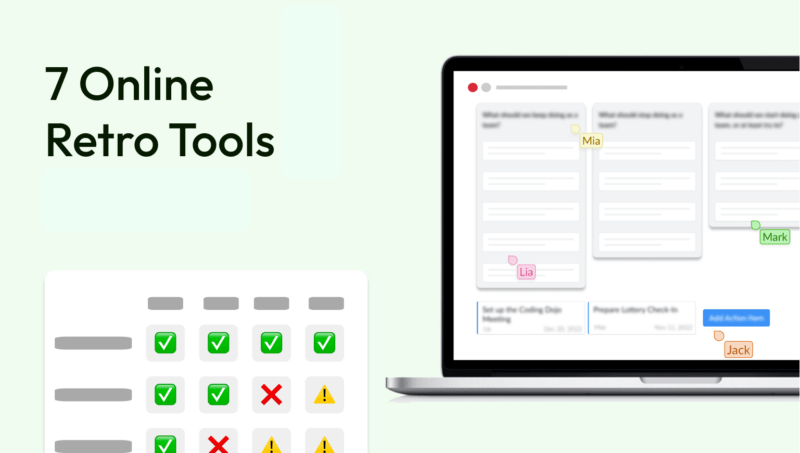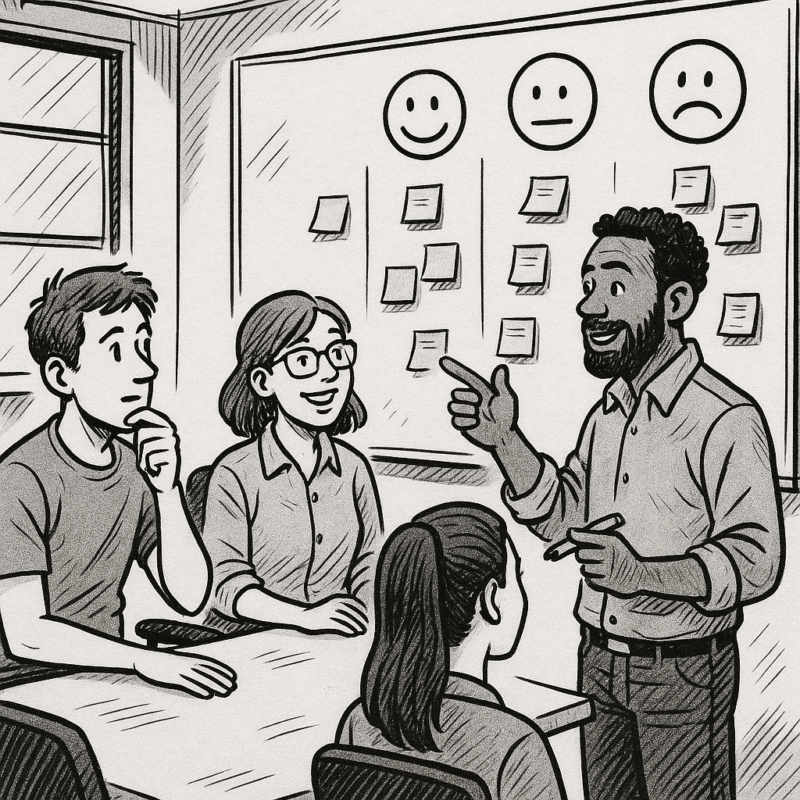Do you want your boss to love you? Well, then increase the performance of your team! Go from being an average car to being an explosive rocket.
How? Download my free and science based eBook on "Reaching team flow in 12 easy steps" and take is seriously. But now let's get to the actual topic of this text.
The moderation and design of retrospectives is often left to trained Scrum Masters and Agile Coaches, who already have a lot of experience with various workshop formats.
In many companies, team members have to slip into the role of a moderator themselves - which is also good. Because moderation is a skill that can be learned and trained and that helps in various areas.
If you are with the Format of the retrospective are not familiar in themselves, it might be worth taking a look at this presentation. Here are our tips if you are moderating a retrospective for the first time:
Tip 1 to moderate a retrospective: Question whether you are neutral enough
With this tip I would like to draw your attention to the fact that the role of a moderator has certain preconditions regarding neutrality. If you act as the opinion leader or leader of a team, you will exert a special influence on the team as a moderator. Even if you (subjectively) neutral the retrospective or similar. moderate. Alone the anticipation of your reaction by participants is an effect that unfortunately cannot be excluded.
A moderator should therefore be a neutral person who is recognized by the team in this role. If this role cannot be filled by a Scrum Master or Agile Coach, it is often a good option to pass the moderation role on to the team in order to give everyone the opportunity to slip into this role and learn from it.
Especially if you as a manager should moderate a retrospective, actively encourage team members to take over the moderation of retrospectives. Or create a pull effect - after all, this is how we actively invest in the further development of moderation skills (not just retrospectives).
Tip 2 for moderating a retro: Prepare the stage with the check-in
As a moderator, you should take an active role, but that doesn't make you the main actor in retro. At least you shouldn't be. Your task is to stage team members as actors and to prepare them for the stage.
In this sense, the check-in acts as a warm-up. So make sure that everyone is actively involved in the check-in and that there is a positive atmosphere in the conversation. If you successfully complete this step, the further course of the conversation will moderate itself.
Here are a few examples of check-in questions that you can use to get started with retro:
- What is your high- or lowlight from last week?
- On a scale from 0 for bad to 10 for super - how are you feeling right now?
Otherwise, there are of course various check-in generatorsto inspire you.
Most Agile Coaches and Scrum Masters run in circles...
...fixing superficial symptoms. Time to use psychology to foster sustainable mindset change.
Tip 3 for moderating a retrospective: Master the idioms of moderation
In the moderation of workshops there are a few recurring patterns, for which there are well-tried formulations that you can adopt and adapt for yourself:
One person (Peter) speaks continuously:
- "Thanks Peter. Let's see what perspectives we still have on the topic. How do the others see this point? "
Discussion between 2 people:
- “I have the feeling that this topic only affects both of you. I write it down in our notes and suggest that you continue the discussion later in pairs. How do you see it?"
Discussion takes too long:
- "Are you sure that given the advanced times it makes sense to continue the discussion here? With X and Y, we have two other topics on the agenda. ”
You can find more examples of such phrases for moderating your retrospective, for example right here. As I said: It is important to adapt the wording so that it suits you and that it the psychological security of the team.
Tip 4: Ask for feedback

Everyone will be considerate the first time you take on the role of a moderator in a retrospective. So take the opportunity to ask openly afterwards for feedback from the participants - both in the group and in individual discussions.
For example, if you are unsure in some situations whether you reacted correctly, ask participants afterwards how they perceived the situation.
This way you maximize your learning effect and are on the way to becoming a top retro moderator.
Tip 5 for moderating the retrospective: Select a simple format
Especially at the first retros, you should choose a simple, well-structured format to moderate the retrospective. For example the classics - "Keep, stop, start", "Mad, sad, glad" or in the next step the sailing boat retrospective. You can also find specific inspiration in these three simple and interactive retro methods. There are many methods for retrospectives that are very demanding in moderation and require strict timeboxing.
A classic among the retro methods is, for example, the "Sailboat Retrospective", which is also suitable for beginners. If you feel like it, check them out in our tool (no login required). Maybe you can try them out:
- ⚓️ Your anchor: What holds us back?
- 🦈🧊 Your shark/iceberg: Which dangers or obstacles approach us?
- 💨 Your tailwind: What drives us forward?
- 🏝💰 Your paradise: What achievement or milestones are we working towards?
Tip 6 for moderating the retrospective: Try out Echometer some day
Existing retro tools can be a great help in facilitating your retrospective. They can relieve you from a lot of work – including facilitation or timeboxing.
In particular, I want to mention the retrospective tool Echometer that I myself helped to develop. It combines insights from psychology with agile best practices to get the best out of team health checks & fun retrospectives - to help to grow your team.
We provide you with specific (whiteboard) templates in the tool that will help you impress your team. It can be used both online and offline, of course.










